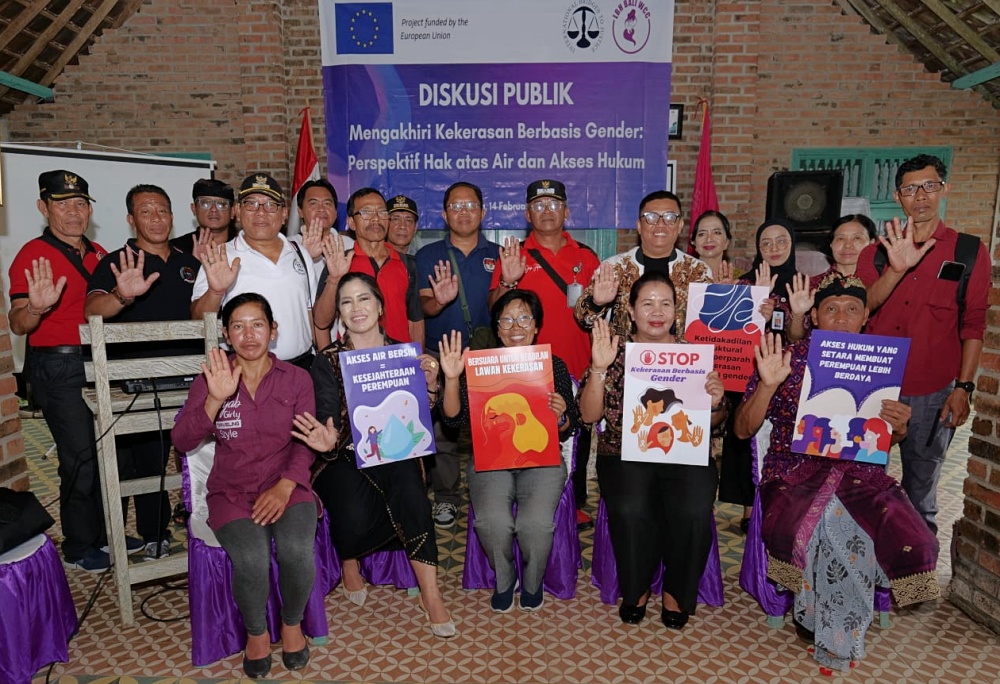Gender Justice Through Equitable Access to Water and Legal Rights
Access to clean water is a fundamental human right. However, in Bali, many communities, particularly women and minority groups, remain unaware of their rights to this essential resource. The unequal distribution of clean water often reinforces gender disparities, making women more vulnerable to gender-based violence (GBV).
In response to this issue, Ni Nengah Budawati, Director of the Bali Women Crisis Centre Legal Aid Institute (LBH BWCC), initiated the KAPAS program (Water Advocacy and Campaign for Women’s Empowerment in Bali). As a JusticeMakers Fellow under the JusticeMakers Perempuan 2024 program, she leads efforts to promote fair water access and gender justice. This initiative is fully supported by International Bridges to Justice (IBJ) and the European Union.
JusticeMakers Perempuan 2024 empowers female criminal defense lawyers to drive legal reform and improve access to justice in Indonesia. Since founding LBH BWCC in 2012, Ni Nengah Budawati has been a dedicated advocate for gender equality, legal policy reform on women’s rights at both local and national levels, and public campaigns to prevent violence against women and children.

Public discussion as part of the KAPAS Program. (Photo: LBH BWCC, 2025)
The KAPAS Program is designed to raise legal awareness and advocate for equitable access to clean water, not only to empower women but also to reduce the risk of gender-based violence by ensuring fair access to this essential resource.
As part of this initiative, the Public Discussion “Ending Gender-Based Violence: Perspectives on Water Rights and Legal Access” was held on February 14, 2025, in Tabanan, Bali. The event aimed to highlight the importance of women's rights to clean water and legal protection, fostering meaningful dialogue and concrete actions to address inequality and mitigate gender-based violence in communities.

Ni Nengah Budawati, Director of LBH BWCC (right), delivers opening remarks at the public discussion (Photo: LBH BWCC, 2025)
“Women in many communities play a crucial role in managing water for household needs. Limited access to water not only impacts their health but also increases their vulnerability to both physical and emotional violence,” said Ni Nengah Budawati in her opening remarks.
Inequitable access to essential resources like clean water perpetuates cycles of discrimination. In remote and rural areas, women often have to walk long distances to fetch water, exposing them to risks of violence along the way or even at home due to the stress and tension caused by resource scarcity.
“This program not only addresses gender-based violence related to water access but also tackles broader forms of gender-based violence in domestic, public, and social spheres, while providing essential legal aid services,” Ni Nengah Budawati added.
The public discussion featured a panel of speakers, including Veryanto Sitohang (Commissioner of National Commission on Violence Against Women), Ni Ketut Sudiani (Researcher at LBH BWCC), and I Made Suwitra (Traditional Village Leader of Penatahan, Tabanan Regency). Moderated by I Made Kariada (Lawyer at LBH BWCC), the event brought together participants from diverse backgrounds, including local government representatives, village officials, academics, women’s and environmental NGOs, women’s and youth communities, and local media.
In his presentation, Veryanto Sitohang, Commissioner of Komnas Perempuan, emphasized, “The state has a duty to ensure fair and equal access to clean water for women. Inequality in access not only violates human rights but also heightens women’s vulnerability to various forms of violence and discrimination.”

Ni Ketut Sudiani, Researcher at LBH BWCC (left) and Veryanto Sitohang, Commissioner of Komnas Perempuan (right). (Photo: LBH BWCC, 2025)
This public discussion also presented findings from LBH BWCC’s research on access to clean water within the framework of equitable and sustainable development. Field studies conducted in Bangli Regency highlight the urgent need to address disparities in water access through increased awareness and advocacy. The KAPAS program aims to be a driving force in ensuring greater protection for women against violence stemming from structural inequalities.
In Bali’s local context, the discussion underscored the importance of strengthening customary law in water resource management, particularly at the village level. Customary law in Indonesia is recognized as part of the national legal system, as stated in Article 18B(2) of the 1945 Constitution: “The state acknowledges and respects traditional communities and their customary rights as long as they continue to exist and align with societal development and the principles of the Unitary State of the Republic of Indonesia, as regulated by law.”
This recognition reaffirms the vital role of customary law in managing natural resources, including water, for communities that uphold traditional practices. Strengthening local customary regulations can support water conservation and help mitigate water crisis driven by unsustainable land conversion for industrial and tourism purposes.
Water scarcity is not only an environmental issue but also deepens social and economic inequalities, increasing the risk of violence, particularly against vulnerable groups such as women and children. A community-driven approach that champions gender justice and equitable access to water is crucial in fostering a safer, more sustainable, and just society for all.

The public discussion brought together participants from diverse community sectors. (Photo: LBH BWCC, 2025)
Raising awareness within communities, particularly among women, about their rights to clean water is a crucial step toward driving more inclusive and equitable policies. This discussion underscored the urgency of strengthening advocacy for women’s water rights, ensuring fair and equal access, and addressing gender-based violence, which remains a pressing issue. A continued commitment to legal protection for women is essential in fostering meaningful and lasting change in society.